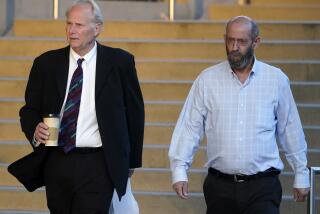Kinkaid Skipper Cites Memory Loss
- Share via
Cmdr. John Cochrane, skipper of the destroyer Kinkaid, which crashed into a merchant ship by the Strait of Malacca, testified Tuesday that he suffered a memory loss in the days after the collision and provided an erroneous account of the accident to an investigating admiral.
Cochrane told an admiral in a written statement immediately after the crash--which killed the navigation officer and injured 17 sailors--that he knew the Kinkaid would reach the busy channel at 5 on the morning of the crash. But the Navy has presented evidence during the court-martial proceedings that Cochrane requested a wake-up call an hour later, which the Navy says shows Cochrane was ill-prepared and criminally negligent.
On Tuesday, the seventh day of hearings, Cochrane, 44, took the stand and said he had made his statement to the admiral because he could not remember the actual events leading up to the crash and did not want to admit to this memory loss.
When he regained his memory days after making the statement, he realized the ship’s navigator had told him the Kinkaid would reach the busy channel at 10 a.m., testified Cochrane, who joined the Navy nearly 21 years ago.
As a result of his conversation with the navigator, Lt. Sean McPhee, 24, of Santa Rosa, Cochrane said, he had not ordered the customary procedures for entering the straits, thinking he had time to do them later in the morning.
A neuropsychologist testifying on Cochrane’s behalf said Cochrane’s memory loss was reasonable in light of his trauma. Lt. Cmdr. David Spaulding, a neuropsychologist at San Diego’s Naval Hospital, testified that Cochrane had symptoms of post-traumatic stress syndrome during the month after the accident.
But the Navy’s prosecutor disputed the expert’s finding. “You have had what can best be described as a memory loss of convenience, sir,” said Lt. Cmdr. Leroy Dickens, the prosecutor.
Cochrane is the first Navy skipper in more than a decade to face a court-martial for the collision of a vessel. To prove that Cochrane was derelict in his duties, Dickens must show Cochrane’s actions or inactions led to the crash of the San Diego-based vessel.
If found guilty, he faces a maximum penalty of two years in the brig, dismissal from the Navy, and forfeiture of all future pay--including his pension.
Navy officials are carefully watching the case, as it explores a longtime Navy doctrine that has maintained a captain is always responsible for his ship.
Cochrane, like every captain, had issued orders to be awakened should the duty officer sight a close-passing vessel or choose a change in course, including altering speed or direction.
But on the night of the crash, Lt. (j.g.) Steven Williams, the duty officer, testified that he had misidentified navigational lights and was confused about the ship’s location.
He ordered more than four changes of course, including one involving a 45-degree change in direction that put the ship on the wrong side of the channel, going against traffic in what has been called one of the world’s busiest shipping lanes. Overwhelmed, he did not summon the captain, Williams said.
He also ignored the warnings of a junior officer who pointed out the merchant vessel twice--50 minutes and 15 minutes before the crash.
The prosecutor maintained that a good captain stays informed about his vessel and that Cochrane’s sloppy management allowed the crew’s performance to deteriorate. To buttress his point, Dickens has summoned witnesses who said only 3 of the ship’s 13 binoculars were fully functioning, the combat information center had 6 instead of 12 sailors manning it, and that many of those on watch were ill-qualified.
Cochrane’s attorneys, however, have argued that the skipper is shirking neither his accountability nor his responsibility for the crash. But they say Cochrane was not negligent because he did not know what was occurring on his ship that night.
“There but for the grace of God goes any ship’s captain,” said retired Adm. Lee Baggett, a former commander-in-chief of the Atlantic Forces and supreme allied commander of the Atlantic Fleet.
“Did you ever go the wrong way on a one-way street?” said Baggett, in an interview after testifying. “It was John Cochrane, but it could have been me. Or any captain.”
In his court testimony, Baggett called Cochrane’s actions “reasonable” in view of the information the skipper had received.
Cochrane’s attorneys rested their defense Tuesday. The prosecutor is expected to call one rebuttal witness and officials say a decision in the case could come as early as today.
More to Read
Sign up for Essential California
The most important California stories and recommendations in your inbox every morning.
You may occasionally receive promotional content from the Los Angeles Times.













